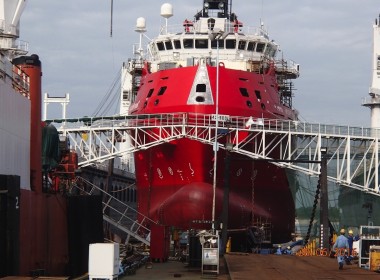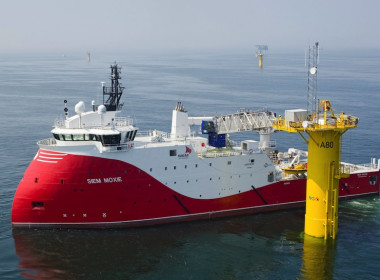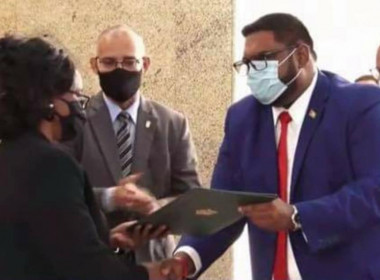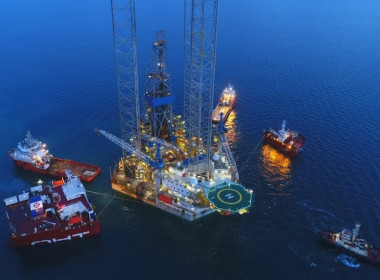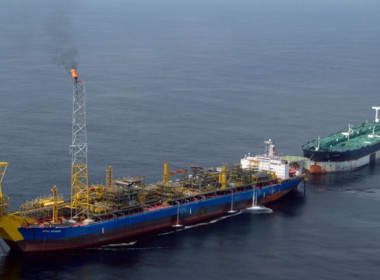COLUMN | José Eduardo dos Santos: the former president of Angola and his not-so-positive legacy [Offshore Accounts]

Last Friday, July 8, will forever be remembered as the date on which former Japanese prime minister Shinzo Abe was assassinated at an election rally in the city of Nara. It was also the date on which former Angolan president José Eduardo dos Santos died in hospital in Barcelona after a long illness.
The current Angolan president, João Lourenco, announced dos Santos’ death to the world, describing dos Santos as a “statesman of great historical stature” who led the country through “very difficult times.” Angola then declared five days of national mourning, from Saturday the ninth through to Wednesday the 13th. Days of mourning, but not public holidays, though.
The United Nations Security Council stood in silent tribute to dos Santos at the start of its meeting on Friday morning, after Brazil’s UN Ambassador Ronaldo Costa Filho, the current security council president, expressed his “sadness” at the former president’s death.
A legacy of peace, national poverty and massive corruption
Arguably, dos Santos had a greater impact on Angola in his thirty-eight-year rule over the country from 1979 to 2017, than Abe had in the just under nine years he led Japan. Much of dos Santos’ influence was not positive, however, and more sadness should be reserved for the 30 million or more people of Angola, who endured much hardship and disappointment under dos Santos’ long and extremely corrupt rule.
His rule is a case study of much of what is wrong in sub-Saharan Africa. Since independence in 1975, the country has been ruled by only one party, the Movimento Popular de Libertação de Angola (MPLA). Like much of Africa, Angola is mired in incredible poverty, with income per head estimated at around just US$2,000. Visit Luanda and you will see shanty towns and shacks cascading down to the sea beside the shiny oil company skyscrapers and five-star hotels in the city centre, whilst the streets are potholed and garbage rots by the side of the road, picked over by the poor.
The median age of the population in Angola is sixteen years old, and the fertility rate sees the average Angolan woman bear more than five children. Half the population lives on less than US$2 per day and most children receive only five or six years of education. The underlying failure of the Angolan economy to generate sufficient jobs or income for a surging population is likely to cause instability over the coming decades.
Hilariously, dos Santos’ own daughter Isabel, formerly Africa’s richest woman, tweeted here that the “large majority of Angolans say the government is doing a poor job on unemployment, improving living standards of the poor, and other economic issues.”
That would seem to be a case of the pot calling the kettle black, as we shall see.
Number two in sub-Saharan Africa
Angola currently produces around 1.1 million barrels of oil a day, second only to Nigeria in sub-Saharan Africa. Most of the crude comes from deepwater offshore fields operated by BP, Total, ENI and ExxonMobil, whilst Chevron operates one of the oldest production complexes in the country off the enclave of Cabinda, north of the Congo River mouth. Angola also has a US$12 billion LNG plant that produces over five million tonnes of LNG per year.
Current oil production is down from a peak of two million barrels a day in 2010. In 2011, the boss of state oil company Sonangol, Manuel Vicente, had predicted that Angola’s crude production would continue to surge to 3.5 million barrels a day by 2020. It wasn’t to be, and the price of oil halved in the period 2014 to 2017, causing an economic crisis in President dos Santos’ final years in office.
Angola is also the world’s sixth largest diamond producer, and diamond exports exceeded a billion dollars a year (here). Unfortunately, the country has very little to show for its natural resources, like so many other developing country oil producers, except for a swag of offshore wealth held by members of the ruling party and their cronies.
We previously covered some of the corruption in Angola under Mr dos Santos here. Today, we look at his life and legacy.
Early life and civil war
Dos Santos’ father was a builder and his mother a maid in Luanda, but after joining the MLPA, he went to Baku to train as a petroleum engineer in the USSR, which supported the Angolan national liberation movement against the Portuguese. In Azerbaijan, he met and married his first wife (Isabel’s mother), who was a Russian chess champion.
Dos Santos was unanimously voted in as Angolan president and party leader by the MPLA’s Central Committee in 1979. His appointment came after Independence leader Agostinho Neto died unexpectedly in the Soviet Union whilst undergoing treatment for pancreatic cancer and hepatitis. Dos Santos was selected as president because many MPLA cadres saw him as the weakest candidate, who would be pliable to their interests and influence. Instead, he survived them all, rarely giving interviews, buying off rivals, and placing himself at the centre of a powerful network of patronage.
Dos Santos brought the country through the dark days of its civil war in the 1980s and 1990s, when his Soviet- and Cuban-backed MPLA party was fighting South African-backed Unita guerrillas. The civil war claimed at least half a million lives and drove four million Angolans from their homes. In addition, like many communist parties, the MPLA also killed thousands of its own members in internal purges led by Neto against his enemies in the 1970s.
1992: Peace’s false dawn
When the Soviet Union fell in 1991, negotiations began to end the civil war. Angola held a presidential election in 1992 with dos Santos of the MPLA running against Jonas Savimbi, the Unita leader. Unita rejected the result of the first round, which saw dos Santos ahead, and the second round of the elections was never held, as Unita took up arms again.
Finally, in 2002, Savimbi was killed by the Angolan military in the east of the country. Angola began clearing up the land mines and disarming the remaining rebels. Dos Santos set about trying to rebuild the country, often using Chinese state loans and Chinese contractors to fund roads, stadiums, and bridges. Whilst elections were held in 2008 and again in 2012, the MLPA never relinquished its grip on power, and government critics were frequently exiled, tortured, or imprisoned.
The Angolan government jailed the author Marques de Morais in 1999 over a series of articles critical of the regime, and then brought new criminal defamation charges against him over his 2011 book, Blood Diamonds: Corruption and Torture in Angola, excerpts of which you can read here. It documents the Angolan military’s brutality against the civilian population.
The pay-off
It was after the death of Savimbi that dos Santos put himself at the epicentre of some of the most corrupt dealings in history. Human Rights Watch had already warned that more than US$4 billion in oil revenue vanished from Angolan state coffers between 1997 and 2002, but over the next fifteen years, he ramped up his embezzlement.
Backed by generals in the Angolan armed forces, dos Santos used the country’s surging oil revenues to funnel money into his own pockets and that of his family and senior members of his government. Between 2002 and 2008 oil prices surged from US$20 a barrel to over US$140 a barrel, and Angolan production more than doubled. The Angolan government budget rose from US$6 billion in 2002 to US$69 billion in 2012. Oil provided 97 per cent of Angola’s export revenues that year, and three-quarters of government income, but employed just one per cent of the workforce.
It mattered not. Dos Santos positioned himself to siphon as much of the cash into his own pockets. In 2013, Forbes magazine reported that the International Monetary Fund believed that at least US$32 billion of oil revenue went missing from the Angolan federal budget between 2007 and 2010, lost to what the IMF described as “quasi-fiscal operations.”
China Sonangol’s sordid dealings
The sordid tale of China Sonangol, the joint venture created between the Angolan state oil company and Chinese interests, headed by businessman Sam Pa from a shadowy office in Hong Kong, could be a book in itself. The company was created to skim cash off oil sales, taking a margin per barrel for every barrel sold by Sonangol.
At the time of writing, Mr Pa has disappeared without trace, and is suspected to have been detained by the Chinese government for corruption.
Its Singapore division built a lavish residential tower of luxury flats just off Orchard Road, with seemingly little comment from the Singapore government, despite the fact that Global Witness and The Economist magazine had run a lengthy investigation into the conflicts of interest and skimming going on in China Sonangol as early as 2011 (here). The development is now fully owned by mainland Chinese interests, after changing its name to CS Land in 2016 to try to avoid the opprobrium of the ethics allegations.
Cobalt’s woes
In 2011, the American authorities began an investigation into allegations that Sonangol boss Manuel Vincente and two generals owned Nazaki Oil and Gas, which was Houston-based Cobalt International Energy’s partner in two offshore blocks in Angolan waters. Cobalt had been awarded the prize pre-salt acreage by Sonangol in what can only be described as suspicious circumstances. The company made seven deepwater discoveries in the blocks, but went bankrupt in 2017 after two SEC investigations into the corruption claims, and the crash in the price of crude.
TotalEnergies took over the blocks and drilled a successful appraisal well on Cobalt’s Golfinho discovery last year. Now the French energy giant expects to develop the Cameia-Golfinho field with a floating production storage and offloading (FPSO) unit with 100,000 barrels of daily production capacity. Upstream has reported (here) that the front runners to deliver the FPSO are our favourite trio of FPSO operators – Yinson, Saipem, and Bumi Armada.
Keeping the kids happy
Many parents give their children pocket money, or help them out when they are at university or starting their careers. Few have been as generous as Mr dos Santos – and generous with the country’s wealth, which he treated as his own.
He gave the chairmanship of the nation’s US$5 billion sovereign fund to his son José Filomeno, known as Zenu. Meanwhile, daughter Isabel was appointed as Chairman of Sonangol. In 2013 she was estimated by Forbes magazine to be worth US$3 billion. A full account of Isabel’s meteoric rise to become Africa’s richest woman is here.
When Angola created its first mobile phone company, Sonangol received a 25 per cent stake, and Isabel dos Santos managed to acquire a 25 per cent stake of her own. She has always alleged that she used her own money to pay for this highly lucrative stake, but has never exactly disclosed how much she paid for it. Forbes estimated that this stake was worth US$1 billion by 2013.
Isabel’s business proficiency showed no sign of abating when her father was president. She acquired stakes in banks, which lent to the Angolan government, and in the Portuguese oil company Galp. She owned supermarkets and cement factories. She celebrated her tenth wedding anniversary with lavish festivities.
What could possibly go wrong for her?
Stepping down, stepping away
Amazingly, though, Mr dos Santos stepped down voluntarily in 2017, as his health began to fail, and handed power to his then minister of defence, the current Angolan President João Lourenco, dashing Mr Vicente’s hopes of taking the top office. This had some surprising consequences.
Zenu and Isabel fired and charged
Lourenco surprised everyone, dos Santos and his clan especially, by launching a surprise campaign to cut off their wealth. He fired Isabel dos Santos as head of the state oil giant Sonangol in November 2017, alleging that Africa’s richest woman had committed embezzlement. Then, in 2019, Isabel’s Angolan assets were frozen, amid a welter of law suits and counter claims. In 2020, her husband died in a diving accident in the UAE.
In 2020, her step-brother Zenu was jailed by an Angolan court for five years over an alleged US$500 million transfer of funds from the country’s national bank to the UK. The prosecution alleged that the transfer was made in the final weeks before his father stood down as president in 2017. Three co-defendants were also accused of fraud, embezzlement, and influence peddling, including the former governor of the national bank of Angola, Valter Filipe da Silva.
The fact that Zenu went to prison for seven months even before the trial shocked the nation, but also led to concerns that the anti-corruption campaign was more about settling historic scores with the former president’s family than stopping corruption across the whole country.
Manuel Vicente’s legal woes
Former vice president and Sonangol chairman Manuel Vicente has also fallen from grace. In June 2017, a Portuguese court ruled that the former vice president should face trial over bribery allegations. He was accused of bribing a magistrate with US$810,000 in order to shelve investigations into his deals at Sonangol. However, he himself remains at large and has not, to our knowledge, been convicted of any crime outside Angola. In 2021, in the Attorney General’s Office of Portugal, he and three other former executives of Sonangol were accused of corruption and money laundering schemes during their time working at the oil company (here). But this case appears not to have reached trial and one must presume his innocence and that of the co-defendants.
China Sonangol losing clout
Since dos Santos relinquished power, China Sonangol’s fortunes have also soured. Last month, the Angolan government seized China Sonangol’s 18 per cent stake in diamond company Catoca, which was owned by a China Sonangol subsidiary called LLI. Catoca owns the world’s fourth-largest diamond mine.
“The attorney-general’s Office of the Republic of Angola blocked LLI’s participation in Catoca in 2021 and transferred control of this 18 per cent stake to the state body IGAPE,” the Financial Times reported here that. “Therefore, Angola holds 59 per cent of the shares in Catoca.”
“We can state for the record that there is no current relationship with Mr Sam Pa,” China Sonangol told the newspaper.
Other cronies in trouble
Another associate of president dos Santos, Angolan businessman Carlos Manuel de Sao Vicente, was sentenced to nine years in prison in Angola for embezzlement, tax fraud, and money laundering, Novo Jornal reported in March this year (here). His business interests once included a 49 per cent stake in the local unit of South Africa’s Standard Bank Group. He was arrested in 2020 after authorities froze US$900 million in several bank accounts in Switzerland.
Despite the multiple claims of criminality against her, Isabel dos Santos lives in London and Dubai. She is free to travel and has never been convicted of any crime outside Angola. She frequently tweets here and has even made frequent claims that – surprise, surprise – the current Angolan President is corrupt and that his Chief of Staff Eldetrudes Costa has received millions in state contracts.
Complicit majors
Every foreign oil major in Angola claims to be compliant with the corruption laws in their home countries, which is quite remarkable given how much corruption has been documented to occur in the sector in Angola, as we have seen. When Angola’s deepwater blocks were assigned in the early 2000s, the “signature bonuses” paid by those majors to the Angolan government were unpublished.
It’s not hard to guess where that cash went, although, of course, the oil companies would say that they had no control over the payments once they were made to the Angolan treasury.
Lessons for Gerontocrats
Dos Santos’s travails after he relinquished power have probably reminded many of the other aging and corrupt despots in Africa why it is not a good idea to hand over power in their own lifetimes. Indeed, for a continent with a very young population, sub-Saharan Africa has a large number of elderly men who have been in power for decades – and many of the region’s oil producers are among them.
Heading the list is Equatorial Guinea’s Teodoro Obiang, who has ruled since 1979, when he seized power from his own uncle in a coup. Obiang’s own children are, like dos Santos’, by-words for corruption and malfeasance, with fast cars, Michael Jackson memorabilia, and a blizzard of corruption claims, as we have covered here. Strangely, Mr Obiang has won over 90 per cent of votes at every election which he has held, whilst attracting investment into offshore oil production from ExxonMobil, Chevron and Marathon Oil. Like Angola, Equatorial Guinea also has an LNG plant.
In Cameroon, the octagenerian president Paul Biya has been in power as president since 1982 after holding the office of prime minister for seven years before that. He has triumphed in five elections since 1992, and made sure that term limits, which might prevent him from standing again, were abolished in 2008.
In the Republic of Congo, Denis Sassou Nguesso has enjoyed two stints in the top job, from 1979 to 1992, then from 1997 until today, after a spot of civil war. Like president Biya, he also conveniently changed the Congolese constitution in 2015 to let himself stand for re-election the following year.
In Gabon, president Omar Bongo Ondimba, who was president from 1967 onwards, was successful at handling power over to his son Ali Bongo Ondimba in 2009, so the family has ruled the country for more than fifty years.
Unsurprisingly, several of these countries were named in the recent indictment of Swiss oil trading house Glencore, which paid a record fine of US$1.1 billion after admitting to the American authorities that it had systematically violated the Foreign Corrupt Practices Act by bribing state oil company officials to the tune of nearly US$80 million (here) and manipulated fuel prices.
Nobody has been held accountable in the countries where the American authorities demonstrated that the bribes had been paid by Glencore, just as nobody in Equatorial Guinea or Angola was prosecuted for receiving the millions of dollars of bribes handed out by FPSO contractor SBM Offshore.
Corruption sadly sustains many regimes in Africa and beyond, and the life of José Eduardo dos Santos contains many lessons for all of us.
Background reading
One of the best accounts of the Portuguese withdrawal from Angola in 1975 comes from Polish journalist’s Ryszard Kapuściński’s reportage Another Day of Life, which captures the fear and horror of the civil war in Angola. The fear engulfed the country as the colonial government collapsed, thousands of Portuguese settlers fled, and the South Africans prepared to invade from the south. Purchase on Amazon here.
Wikipedia’s summaries of how the War of Independence (here) against the Portuguese became the Civil War of 1975 to 2002 (here) serve as excellent introductions to the country’s violent and traumatic past.
The Angola LNG website is here.
Isabel dos Santos’ epic “Lunch with the FT” when she was at the apex of her riches in 2013 is here.
The Organised Crime and Corruption Reporting Project has an excellent report from 2020 entitled “How Angolan Elites Built a Private Banking Network to Move Their Riches Into the European Union” (here). The network sent at least US$324 million through its banks, with most of the funds originating in Angola. In addition, US$257 million was found to be held by European companies closely affiliated with these officials. Manuel Vicente and his partners were among the participants, OCCRP alleged.
For the US$150 million of loans which associates of former president dos Santos never paid back to the Angolan national bank, see here.


![COLUMN | José Eduardo dos Santos: the former president of Angola and his not-so-positive legacy [Offshore Accounts]](https://www.bairdmaritime.com/wp-content/uploads/OFFSHORE-WEEK-Banner-860x130-6.gif)
